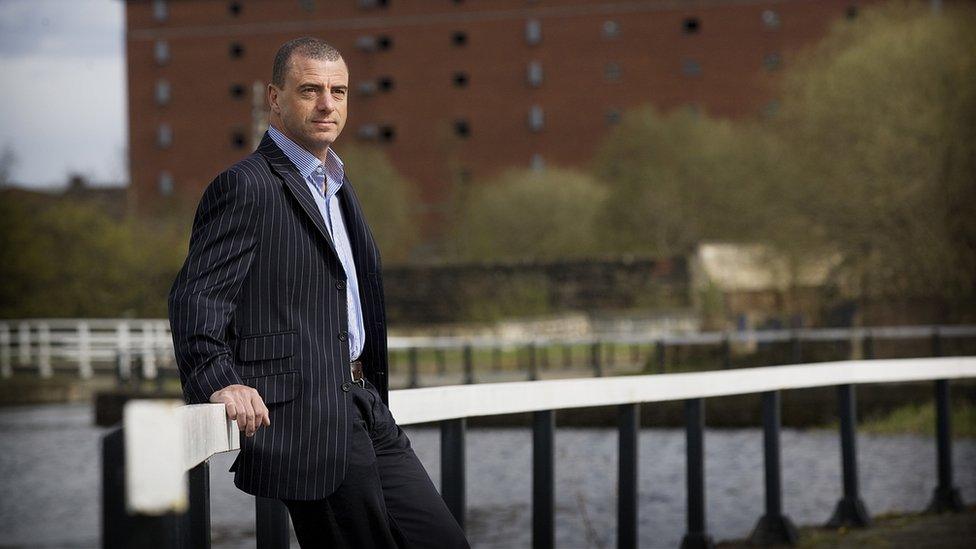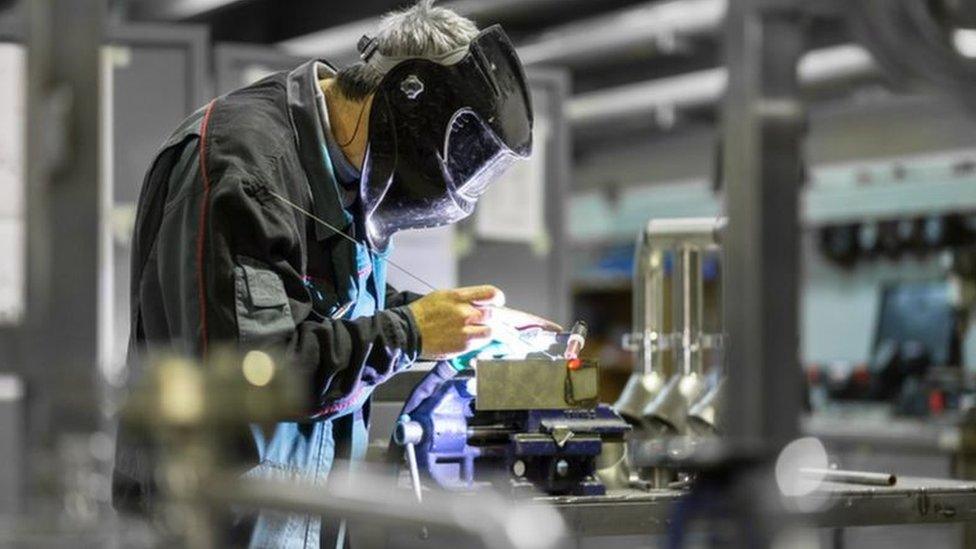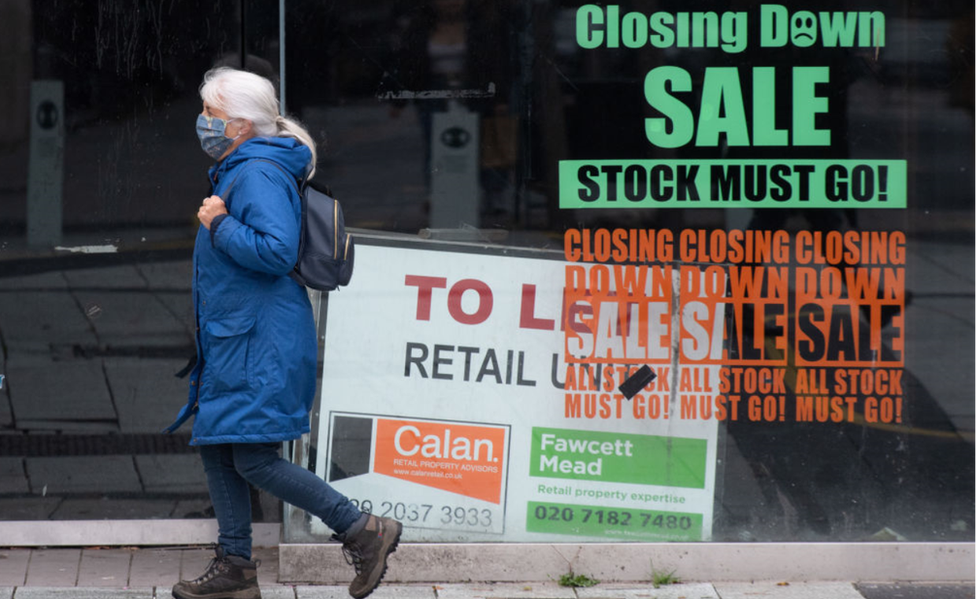Scottish Enterprise: A head rolls, but why?
- Published

Steve Dunlop quit after two years as the head of Scottish Enterprise
There's growing frustration and anger within Scottish business at the latest restrictions on commercial activity, and questions about the advice ministers are hearing.
Some of that frustration is also apparent in the sudden resignation of the boss of Scottish Enterprise.
Steve Dunlop says this is the "right time", but behind that lies prolonged attrition and a struggle to move forward on economic initiatives.
There's anger and frustration within the business community, and it extends into the Scottish government's lead agency on the economy.
Business lobby groups say they understand the difficult balancing act that ministers have to perform in deciding on infection control measures. But their patience is wearing thin with the decisions being made.
Health advice is coming at ministers from world-class experts. Ministers say they are trying to retain a bond between politicians and the public they represent, as key to the compliance they need.
But who is speaking for business at the Scottish cabinet table? Maybe it is economy secretary Fiona Hyslop. Finance secretary Kate Forbes has a brief that crosses into economic issues.
Veteran SNP figure and minister Fergus Ewing is responsible for links into the tourism sector, and was the key to the measures agreed on Friday for spending £40m to mitigate the new lockdown measures.
But he's long been seen as a rare voice of the economic right of the SNP, and some distance from the First Minister's economic instincts.
'Fresh perspectives'
How does this compare with the Downing Street cabinet? It seems that is the forum for a feistier exchange of views on striking the right balance, and that may be one reason the public message has seemed more muddled.
Economic ministers are led by the Chancellor, Rishi Sunak. His team, which has been smart in positioning him as the man to beat if Boris Johnson has to quit, have let it be known this weekend that he took on the medical advisers on the quality of their evidence that pubs and restaurants are the source of infection spread.

Scottish business faces its toughest challenges in modern times
But it seems there's no-one in Scotland playing that role at the centre of power. Entrepreneur Sir Tom Hunter suggested, as lockdown was first eased, that there's a need for a lead business adviser having as much access to decision-making as the medical and scientific team.
Perhaps such a role could go to the leader of the Scottish government's economic development agency, Scottish Enterprise. You might think Steve Dunlop would be drawn into decision-making, and advising on how best to support the economy.
You'd be wrong. Instead, he just quit. Only 45 minutes before the new restrictions were being set out at Holyrood last week, his bombshell landed in an emailed press release. It was a good moment to explode bad news.
In the statement, Mr Dunlop said; "Throughout my career I've always prided myself on knowing when the time is right to move on and let new and fresh perspectives come to the fore. Now is that time."
Think about that for a moment. Can you think of a worse time to be looking for new and fresh perspectives? Scotland has just been through the biggest shock to its economy in centuries, and within weeks, the company failures and job losses are expected to soar.
'Delivery frameworks'
Mr Dunlop has been in post for less than three years. He isn't leaving immediately, but nor is he waiting for a successor to be appointed. Ministers and Scottish Enterprise chairman Lord (Robert) Smith knew this was coming a week before, but had not decided on an interim replacement.
The chairman and Fiona Hyslop issued generous statements of gratitude for Steve Dunlop's work at the agency. These are sometimes a condition of a high-level departure without public rancour.
And sure enough, Steve Dunlop isn't saying any more - not to me, anyway. But I've taken soundings, and found that this was every bit as unhappy a departure as the circumstances would suggest.
The efforts of Scottish Enterprise to get traction or leverage in St Andrew's House have come to little. The push to drive forward a medium to long-term economic recovery plan was first handed to a committee led by banker Benny Higgins and then chipped into the long grass.
Ministers and officials are busy on the short-term imperative of getting through the crisis, including the funds and schemes to mitigate the enforced closure of hospitality businesses.
Scottish ministers, it seems, are more than willing to set up reviews, task forces and working parties. They will promise and announce "delivery frameworks". But implementing the framework? Well, that rubber is not hitting the road.
When the agency has asked for clarity on the way many millions of pounds will be allocated with the creation of the Scottish National Investment Bank, the answer that came back: "Sort it out amongst yourselves, we're busy."
Decluttering farce
There wasn't a single flashpoint that led to the resignation this week, but instead prolonged attrition, and a weakening of the agency's autonomy.
While ministers appeal to the Treasury in London to give them more advance notice of future budgets, similar appeals from the enterprise agency to St Andrew's House have gone unheeded. This is not new. The enterprise budget has long been a favourite target for ministerial raids.

Under Nicola Sturgeon, and when Keith Brown was the minister responsible, there appeared to be an intention to declutter agencies, folding it into other economic quangos.
But that turned to farce: instead of fewer agencies, we ended up with one more, for the south of Scotland, with a new board to oversee them all.
Apparently, relations have not worked as well since Derek Mackay - both finance and economy secretary - was forced to quit his post in February, shamed by a personal scandal.
A quiet U-turn
Yet for all the thwarting of effort, Steve Dunlop leaves a significant legacy in Scottish Enterprise. Under his leadership, and against inevitable internal resistance, it pivoted back to a more wide-ranging role in supporting communities as well as businesses, with a clearer social dimension.
When the SNP first took power, in 2007, it had moved away from that role to focus on a limited number of companies with high-growth potential. So we've seen a quiet but significant U-turn in the way the SNP handles the economy.
I'm not picking up any indication that Scottish Enterprise is set for a further radical change.
Attention now shifts to MSPs who oversee the enterprise agencies, and who may choose to challenge the official version of this resignation.
It also shifts to Lord Smith, a formidable veteran of boardrooms, the Commonwealth Games, and of chairing the all-party group that led to more powers at Holyrood.
He can expect to get more attention from government ministers and officials when he next hooks up to a Zoom call with St Andrew's House.